Our shared path
Good evening graduates!
Thank you, President Sasse.
As a proud Florida Gator, I love being with you in the Swamp.
As a proud Floridian, I love all swamps!
This past century, the swamps of South Florida gave last refuge to our state animal — the Florida panther.
These swamps were home to the last population of big cats in the eastern U.S.
At one point, only 20 survived!
These swamps became my office.
My commute looked like this …
-(1).gif)
National Geographic's Path of the Panther
And I often had to yield to oncoming traffic like this …
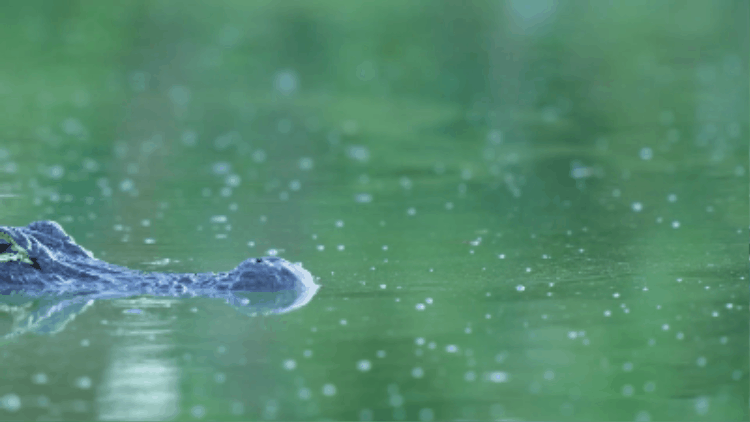
Carlton Ward Jr. / Wildpath
Fellow Gators, tonight many of you are thinking of your path ahead.
I want to talk to you about our shared path.
As graduates of this great university, we have been prepared and inspired to forge a path to professional success — and a better world.
My path began right here at UF as a graduate student and culminated 20 years later with the Path of the Panther project and creation of the Florida Wildlife Corridor.
What I learned is that the best path is a shared path.
A path of collaboration to bring people together around the greater good and make space for others …
...whether those others are across town… across the political aisle … or even across species …
I was finishing up my UF graduate classes in 2001 when I landed a photography internship on an expedition to the rainforests of Central Africa.
Three years and six expeditions later, I had published national magazine stories and exhibited at the United Nations.
But my path pointed me back home to Florida.
Every time I returned on an airplane from Africa, I saw cattle ranches and other green spaces replaced by roads and rooftops.
It felt personal.
My family has been in Florida for nine generations, and I have many cousins who are ranchers here today.
My cousin Doyle Carlton Jr., who attended UF in 1940, told me how as a child he helped move cattle on horseback for three days at a time. Sleeping under the stars … and never seeing a fence.
His world was unseen, overlooked, and forgotten.
I remember writing those words 20 years ago.
It was the insight that led to my first long-term project photographing Florida’s ranchlands and cowboys.
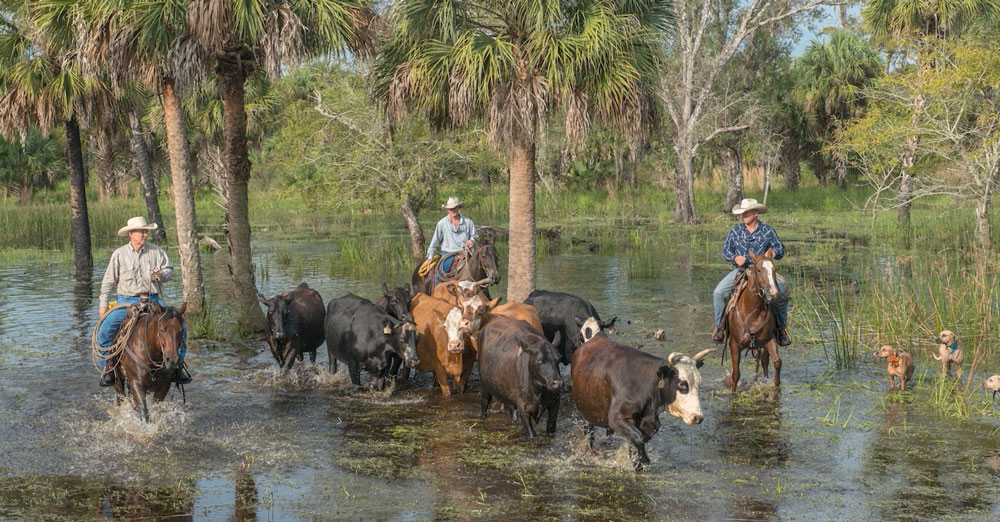
Carlton Ward Jr. / Wildpath
It was the insight that led to my path: Photographing places that must be seen to be saved.
My journey into the hidden heart of Florida to find the rare and elusive panther would also teach me about the profound power of shared paths.
While shooting ranchlands in Central Florida, I learned how far-ranging bears and panthers need those working lands as much as any national park.
And I learned about the science of wildlife corridors, which was pioneered by — and is still led by conservation heroes here at UF.
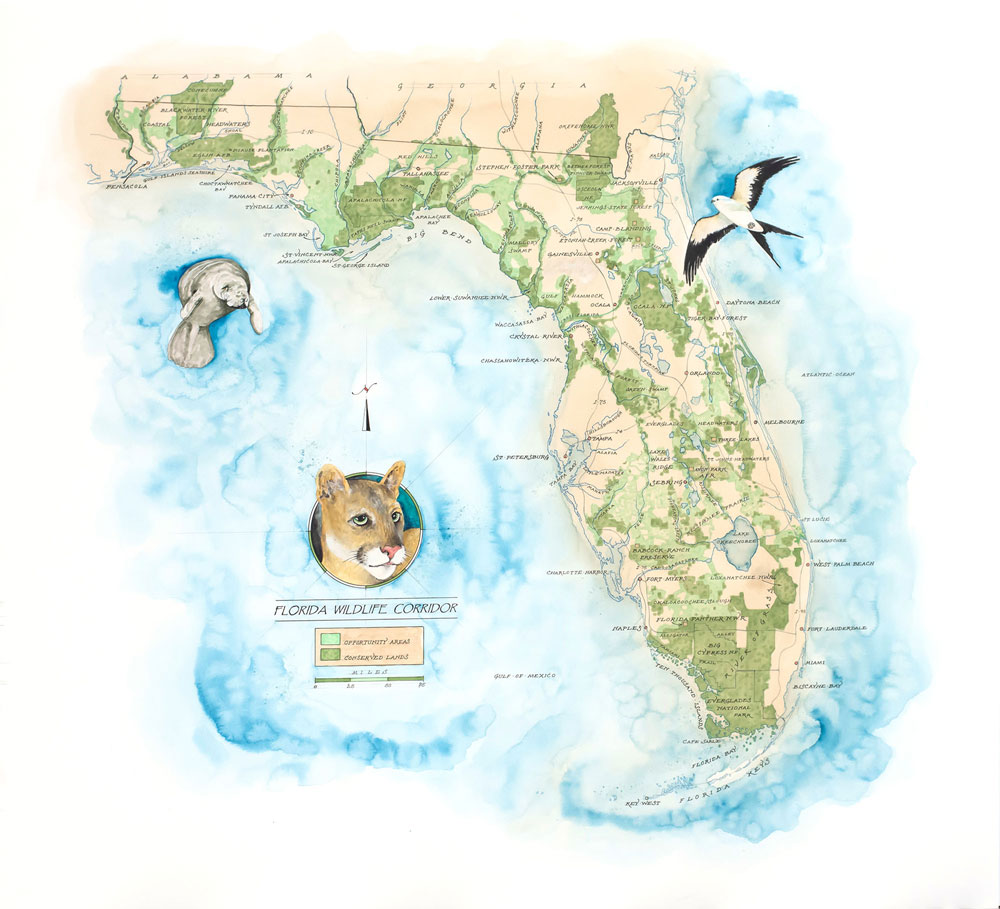
Florida Wildlife Corridor map
Wildlife corridors are stretches of land — both public lands and private lands such as ranches — that together form a larger connected landscape.
Corridors give wild animals the space they need to survive.
Corridors are literally shared paths.
They’re key to the survival of the panther and many other species — and arguably our own.
With the help of scientists from UF’s Center for Landscape Conservation Planning and partners across the state, I started the campaign for the Florida Wildlife Corridor.
I hiked and paddled with teammates for 2,000 miles through the last connected wilds of our state.
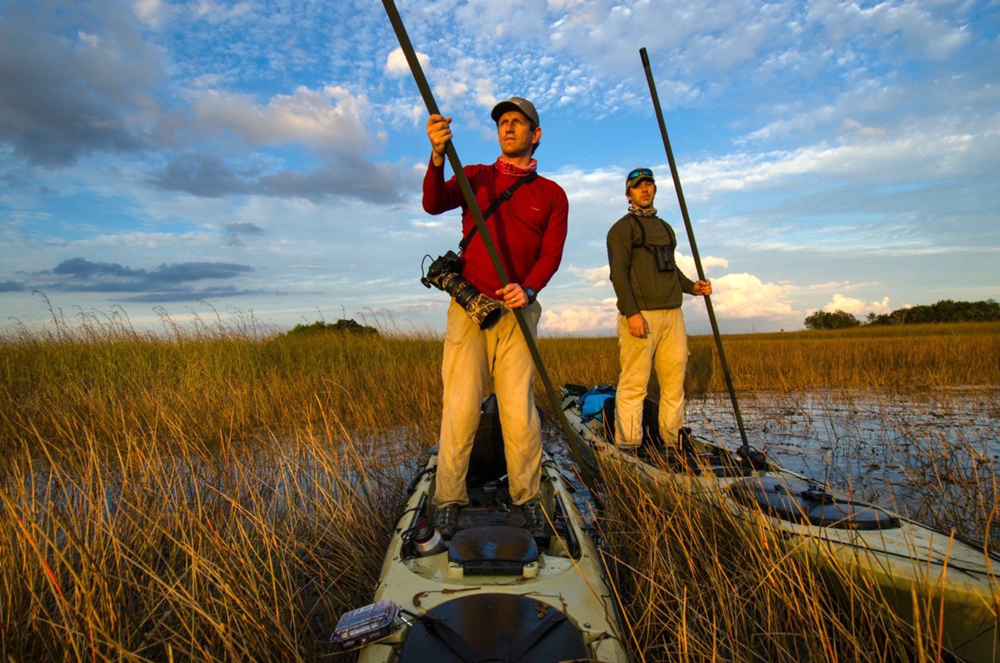
Carlton Ward Jr. / Wildpath
Even with a lifetime exploring wild Florida, I had only once seen a panther with my own eyes — just a fleeting glimpse crossing a trail.
Yet I knew this mysterious and legendary cat was key to helping people understand the need for the wildlife corridor.
It would become a story for National Geographic.
But first, I had to photograph the Florida panther.
I would be chasing a ghost.
A phantom I knew was there but may never see.
It would require a camera trap.
So, I waded waist-deep in the swamps, dodging gators and clouds of mosquitoes, searching for trails I hoped a panther would cross.
Then I set up a professional camera in a waterproof box, triggered by an invisible beam.
The idea is for a panther to walk by and take its own picture!
But the odds are against you.
Even in my best spots, a panther might come by once a month, sometimes only once a year...
… and then it might not be facing the camera … and then my sensitive electronics that languished in the rain and heat might not work.
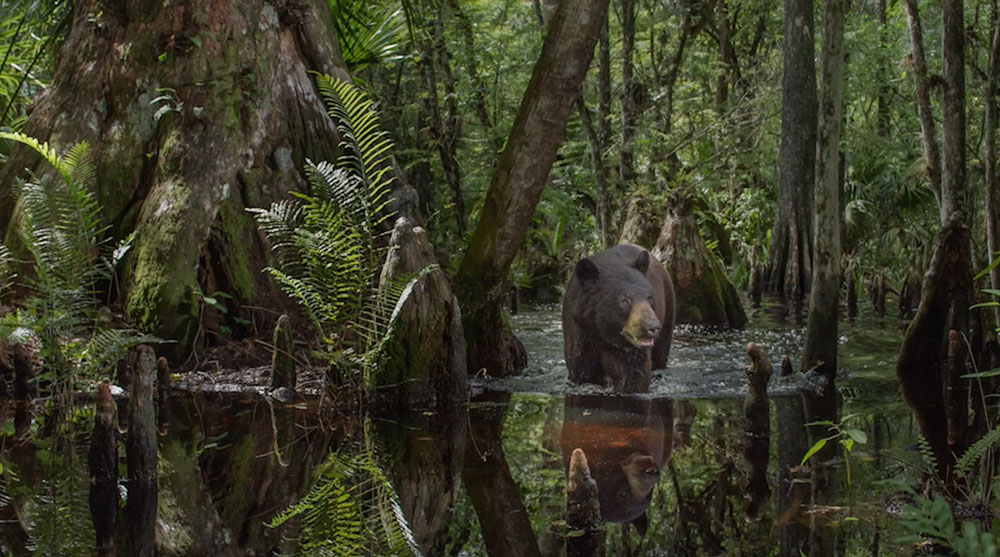
Carlton Ward Jr. / Wildpath
During my first two years trying, my cameras caught lots of other animals sharing the path … but no great photos of panthers.
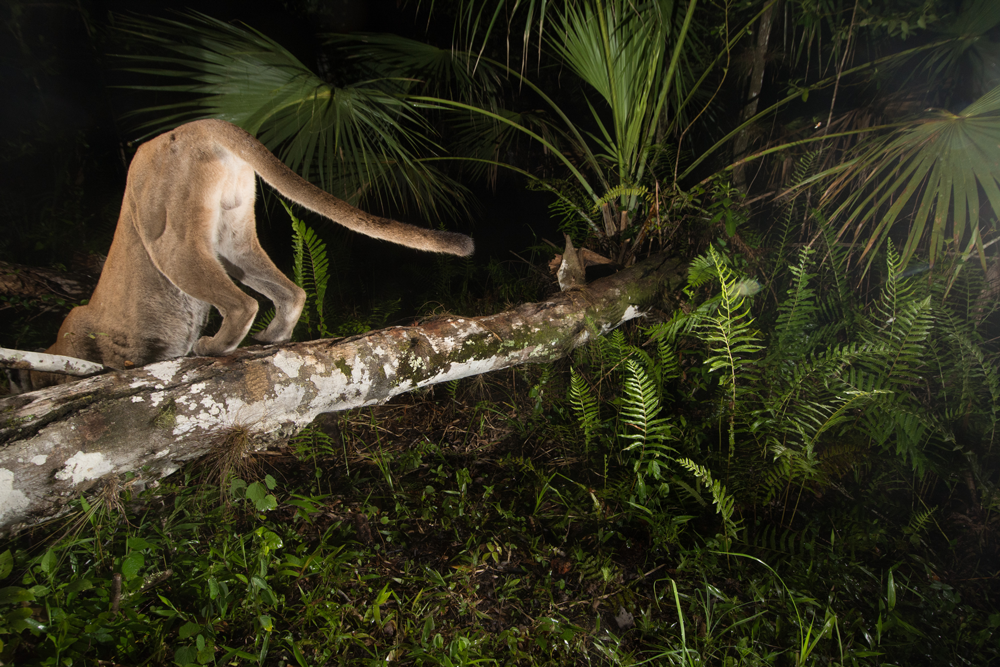
Carlton Ward Jr. / Wildpath
When the rare panther did pass by, the photos were like these …
And more often than you’d think, my setups would be attacked by another swamp animal …
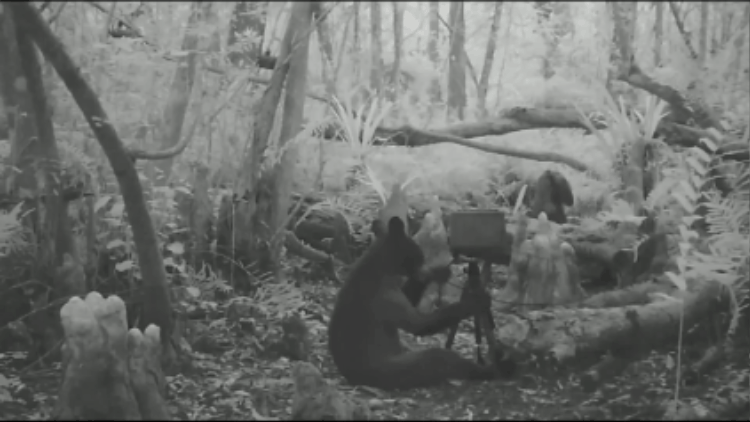
Carlton Ward Jr. / Wildpath
It’s funny now, but each time a bear decided to scratch itself on one of my cameras, it would set me back a month!
I had cameras chewed by mice.
Burned by wildfires.
Drowned by floods.
Even shot by a rifle!
Then two years in, Category 4 Hurricane Irma wiped out my traps.
It was two weeks after the storm before I could chainsaw my way to one of my favorite sites.
I found my camera box bobbing beneath the surface of the swamp.
When I opened it, nearly a gallon of brown water poured out.
My camera was ruined.
But I was able to recover the memory card.
What I found first were more than 3,000 false triggers from Irma.
But then … beneath all those empty frames … I found this …
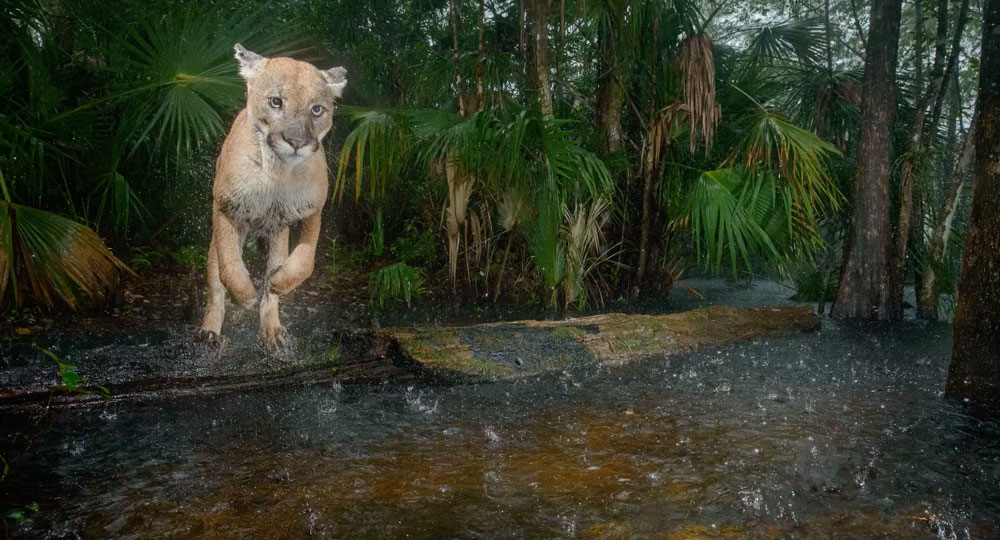
Carlton Ward Jr. / Wildpath
That’s the sound of a gator like the one I often saw at this camera site …
... a wildness that has reverberated through swamps since the time of the dinosaurs.
The call of the gator reminds us of our own wildness – and our strength to persevere.
Just when my failures made my path feel impossible, this image of a resilient panther flying through the swamp despite a major hurricane gave me hope to press on.
Finally, I had one photo I knew the world would see.
Four years later, in 2021, the full story was published in National Geographic, with a double page map of the Corridor!
Thanks to my team at Wildpath and many partners, the Florida Wildlife Corridor Act was by then before the Legislature, and we gave a copy of the magazine to every lawmaker in Tallahassee.
The law passed with unanimous bipartisan support, prioritizing conservation for nearly half the state — 10 million acres of existing public lands and 8 million acres of working ranches and farms.
The Florida Wildlife Corridor took so much more than me, a camera, and an elusive swamp cat.
It took dedicated teams across multiple organizations.
It took passionate philanthropists and brave policymakers.
It took cowboys and scientists, hunters and environmentalists, fishing guides and farmers, road builders and conservation agencies, newcomers and natives.
It took the 115 House members and 40 Senators who voted for the bill, and Governor DeSantis, who signed it into law.
I am grateful to everyone who created this shared path.
I am especially grateful for the love and support of my wife Suzie, a fellow Gator, who is here tonight, and our children, Eldridge, Nell and Carlton.
Since the Florida Wildlife Corridor Act passed, the state has conserved nearly 200,000 acres, and committed more than $2 billion to a goal of conserving a million acres by 2030.
Florida is now a global model for this shared path to meeting the needs of people and nature — together.
Graduates: Tonight, you stand at a new trailhead looking out across the horizon, empowered by the diploma you’re about to receive, ready to forge your own path.
As you do so, I hope you will remember the importance of the shared path.
That’s what my journey with the Florida panther and the Florida Wildlife Corridor taught me.
From the thousands of other species that rely on the path of the panther, to the diverse partnerships that came together to inspire unanimous law …
It’s about the path we share.
There will be times when the path feels treacherous.
Or narrow.
Or lonely.
When that happens, step back and reframe your view.
There is always a shared path.
There is always a unifying story.
Step far enough back, and we see that everyone in this stadium is part of the same family.
On that note, let’s do a quick family portrait.
I’ve set a camera trap high up in the stadium.
Hopefully no bears have found it!
Look up to your left toward section nine, and on the count of three, let’s do the Gator chomp.
One… two … three
